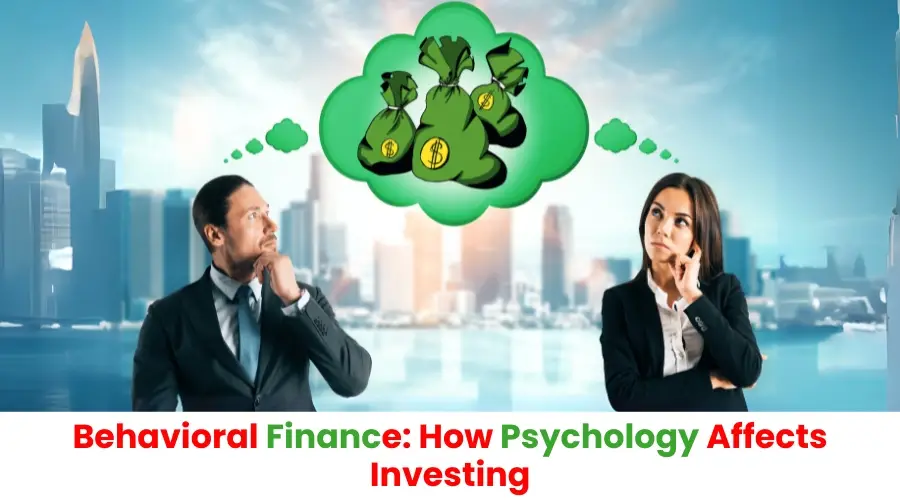Behavioral Finance: How Psychology Affects Investing
Introduction: Mind vs Money
When it comes to investing, your biggest enemy is not the market… it's your mind. You can learn all the technical indicators and market news, but if your emotions take over, losses aren't far behind. That's why Behavioral Finance is so important. It tells us why we do what we do with our money, particularly when things don't turn out the way we want. And if you actually want to learn how to manage your brain before your bank, begin with professional-conducted share market classes in Nagpur that cover psychology and investing side-by-side.

What Is Behavioral Finance?
Behavioral finance is a study of how psychology affects investor choice.
It tells us that:
- Humans don't always behave sensibly.
- Feelings tend to override reason more often than not.
- Biases cause us to make poor choices despite knowing better.
- It interconnects dots between human psychology and investment errors.
Why Emotions and Biases Matter in Investing
You may believe investing is all about numbers, charts, and analysis.
But really, it's also about:
- Fear of losing money
- Greed for profit
- Regret of not being on a stock run-up
- Ego when an idea in a stock pays off
That's why investors tend to buy high and sell low, although common sense dictates to do otherwise!
Popular Investor Biases That Damage Your Portfolio
Let's examine the most popular mental pitfalls:
Confirmation Bias
You look for news that confirms your opinion only.
Example: You are convinced Tata Motors will go up, so you read good news only and suppress warnings.
Overconfidence Bias
You believe your analysis is flawless and pay no attention to risk.
Result? You over-invest in a single stock, and if it dips — you panic.
Herd Mentality
You invest because everybody else is investing. No sense, just fear of missing out (FOMO).
This is how market bubbles are created (and burst).
Loss Aversion
The agony of losing ₹100 is greater than the pleasure of gaining ₹100.
That's why we never sell our losing stocks, expecting to break even.
Anchoring Bias
You become so stuck on the price you purchased the stock for, even when circumstances shift.
Consequence: You don't sell poor stocks simply because you purchased it at ₹100.
Real Indian Market Examples of Psychological Traps
Yes Bank: Lots of retail investors continued to buy at ₹50, ₹30, ₹20. believing it would recover. Why? Anchoring + Loss Aversion.
Adani Rally (2023): Several came in during the frenzy at all-time highs without learning fundamentals. Old Herd Mentality + FOMO.
How Behavioral Finance Makes Sense of Market Crashes
In times of market crashes:
- Fear travels faster than facts.
- Investors panic sell without looking at fundamentals.
- Even good stocks drop — because everybody's trying to exit in a hurry.
Behavioral finance makes sense of the fact that markets are not always rational — they're emotional playgrounds in times of crashes and rallies.
Tools to Develop Emotional Discipline in Investing
Here's how you can become more disciplined:
- Utilize SIPs rather than lump sum to eliminate emotional choices.
- Establish investment rules and follow them (such as asset allocation).
- Don't check prices daily — it creates fear.
- Keep a record of your investing choices and the reasons why you made them.
Handy Means to Implement Behavioral Finance in Your Strategy
- Don't chase market noise — stick to your plan.
- If you are too excited or fearful — step aside from buying/selling.
- Always question yourself — "Am I doing this out of logic or emotions?"
- Learn from previous errors and your actions. That's your real investing guru.
Common Mistakes New Investors Make
- Buying on the basis of WhatsApp/Telegram tips.
- Selling prematurely due to small profit fear.
- Holding losers forever in expectation.
- Investing without aim or plan.
- Daily portfolio comparison with others (comparison kills concentration).
Conclusion: Plan, Don't Panic
Markets go where people go. And people go where emotions go.
If you want to win, learn to control your emotions better than you control your money.
And if you're willing to be an investor who knows not only charts, but also decisions, enroll in the best share market institute in Thane and learn practical investing.
Stock market is not just about tactics, but psychology too.
Disclaimer
This blog is provided for general information only and does not represent financial advice. Please take investment decisions after consulting a SEBI-registered financial advisor. Past performance is not indicative of future outcomes. Investments have inherent market risks — learn before you earn.
FAQs
Q1. Are emotions actually a factor in investing?
Yes, emotions trigger panic selling, greedy buying, and ill-timed entry — impinging on long-term profits.
Q2. How do I know if I'm acting emotionally?
If you're reading prices daily, flinching at every minor loss/gain — that's a warning sign.
Q3. Is behavioral finance covered in stock market courses?
Good ones — yes! Practical institutes teach it along with technical/fundamental analysis.
Q4. Can I ever get emotion-free in markets?
Not 100%, but with time, learning, and practice — you'll react smarter.



